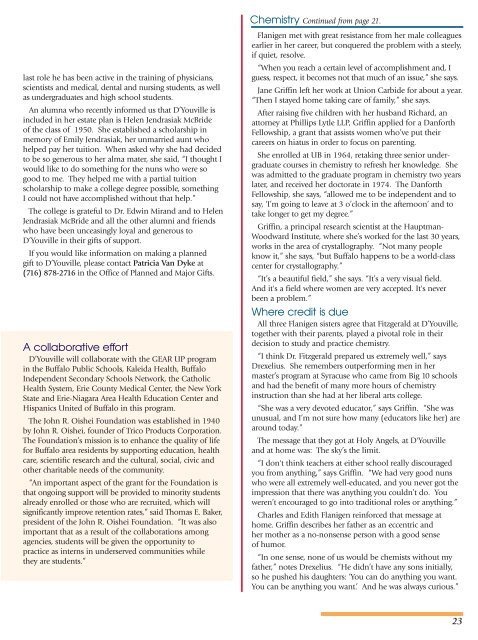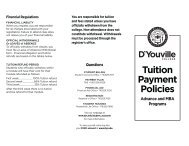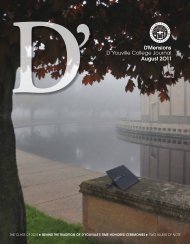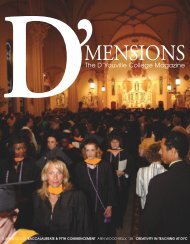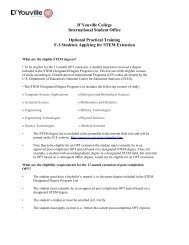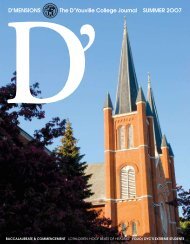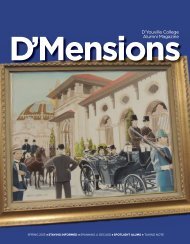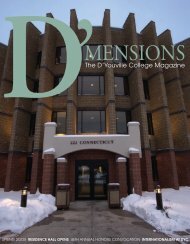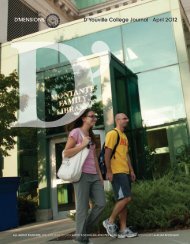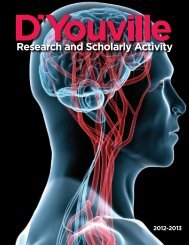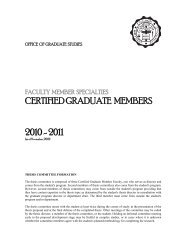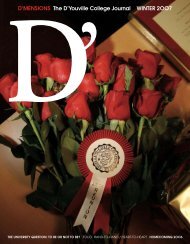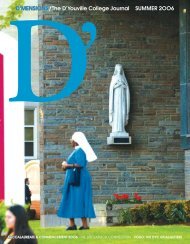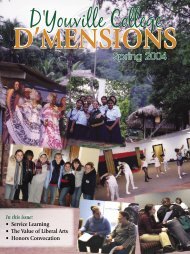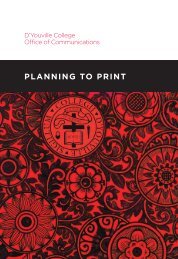Summer 2004 In this issue: - D'Youville College
Summer 2004 In this issue: - D'Youville College
Summer 2004 In this issue: - D'Youville College
Create successful ePaper yourself
Turn your PDF publications into a flip-book with our unique Google optimized e-Paper software.
last role he has been active in the training of physicians,scientists and medical, dental and nursing students, as wellas undergraduates and high school students.An alumna who recently informed us that D’Youville isincluded in her estate plan is Helen Jendrasiak McBrideof the class of 1950. She established a scholarship inmemory of Emily Jendrasiak, her unmarried aunt whohelped pay her tuition. When asked why she had decidedto be so generous to her alma mater, she said, “I thought Iwould like to do something for the nuns who were sogood to me. They helped me with a partial tuitionscholarship to make a college degree possible, somethingI could not have accomplished without that help.”The college is grateful to Dr. Edwin Mirand and to HelenJendrasiak McBride and all the other alumni and friendswho have been unceasingly loyal and generous toD’Youville in their gifts of support.If you would like information on making a plannedgift to D’Youville, please contact Patricia Van Dyke at(716) 878-2716 in the Office of Planned and Major Gifts.A collaborative effortD’Youville will collaborate with the GEAR UP programin the Buffalo Public Schools, Kaleida Health, Buffalo<strong>In</strong>dependent Secondary Schools Network, the CatholicHealth System, Erie County Medical Center, the New YorkState and Erie-Niagara Area Health Education Center andHispanics United of Buffalo in <strong>this</strong> program.The John R. Oishei Foundation was established in 1940by John R. Oishei, founder of Trico Products Corporation.The Foundation’s mission is to enhance the quality of lifefor Buffalo area residents by supporting education, healthcare, scientific research and the cultural, social, civic andother charitable needs of the community.“An important aspect of the grant for the Foundation isthat ongoing support will be provided to minority studentsalready enrolled or those who are recruited, which willsignificantly improve retention rates,” said Thomas E. Baker,president of the John R. Oishei Foundation. “It was alsoimportant that as a result of the collaborations amongagencies, students will be given the opportunity topractice as interns in underserved communities whilethey are students.”Chemistry Continued from page 21.Flanigen met with great resistance from her male colleaguesearlier in her career, but conquered the problem with a steely,if quiet, resolve.“When you reach a certain level of accomplishment and, Iguess, respect, it becomes not that much of an <strong>issue</strong>,” she says.Jane Griffin left her work at Union Carbide for about a year.“Then I stayed home taking care of family,” she says.After raising five children with her husband Richard, anattorney at Phillips Lytle LLP, Griffin applied for a DanforthFellowship, a grant that assists women who’ve put theircareers on hiatus in order to focus on parenting.She enrolled at UB in 1964, retaking three senior undergraduatecourses in chemistry to refresh her knowledge. Shewas admitted to the graduate program in chemistry two yearslater, and received her doctorate in 1974. The DanforthFellowship, she says, “allowed me to be independent and tosay, ‘I’m going to leave at 3 o’clock in the afternoon’ and totake longer to get my degree.”Griffin, a principal research scientist at the Hauptman-Woodward <strong>In</strong>stitute, where she’s worked for the last 30 years,works in the area of crystallography. “Not many peopleknow it,” she says, “but Buffalo happens to be a world-classcenter for crystallography.”“It’s a beautiful field,” she says. “It’s a very visual field.And it's a field where women are very accepted. It's neverbeen a problem.”Where credit is dueAll three Flanigen sisters agree that Fitzgerald at D’Youville,together with their parents, played a pivotal role in theirdecision to study and practice chemistry.“I think Dr. Fitzgerald prepared us extremely well,” saysDrexelius. She remembers outperforming men in hermaster’s program at Syracuse who came from Big 10 schoolsand had the benefit of many more hours of chemistryinstruction than she had at her liberal arts college.“She was a very devoted educator,” says Griffin. “She wasunusual, and I’m not sure how many (educators like her) arearound today.”The message that they got at Holy Angels, at <strong>D'Youville</strong>and at home was: The sky’s the limit.“I don't think teachers at either school really discouragedyou from anything,” says Griffin. “We had very good nunswho were all extremely well-educated, and you never got theimpression that there was anything you couldn’t do. Youweren’t encouraged to go into traditional roles or anything.”Charles and Edith Flanigen reinforced that message athome. Griffin describes her father as an eccentric andher mother as a no-nonsense person with a good senseof humor.“<strong>In</strong> one sense, none of us would be chemists without myfather,” notes Drexelius. “He didn’t have any sons initially,so he pushed his daughters: ‘You can do anything you want.You can be anything you want.’ And he was always curious.”23


